Exotic Pet Tales: Backyard Flocks in New England (Chickens, Ducks, Swans, and Geese)
May 28, 2019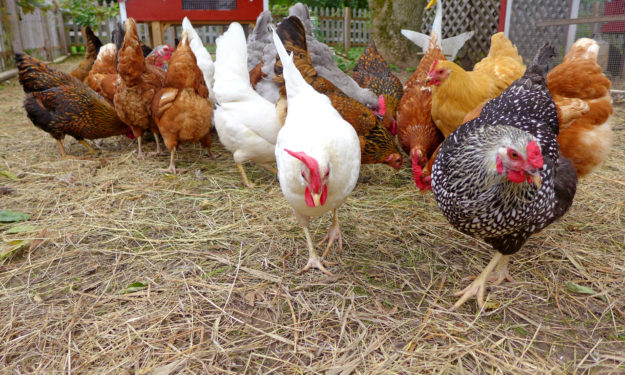
Written by: Mike Corcoran, DVM, DABVP (R/A), CertAqV
Some of my favorite birds are chickens and ducks. I really love their personalities. They can be a lot of fun to have around if you have the space and time to care for them well. They can also provide very nutritious fresh eggs to be eaten!
There are numerous resources for how to care for backyard birds, but there are definitely some misconceptions that I would like to clear up from a veterinarian’s point-of-view and some things unique to New England that should be discussed. Unfortunately, a lot of the care and nutrition information is based on large commercial flocks with animals that are meant to make lots of eggs and grow large quickly. These birds are also only expected to live for a few years. Changes need to be made to this advice in order to give the best quality of life and longevity to our backyard pets.
Caging
The setup for housing needs to strike a balance between protection and allowing room for exercise. Most people allow free range time during the day and lock the animals in the protection of a coop at night, especially for chickens.
The coop
The coop should be secure enough to keep out all predators including weasels.
The floor should be relatively soft: dirt rather than wood or tile. Line the floor with straw or hay. This is harder to clean, but pododermatitis (“Bumblefoot”) is very common in all chickens and waterfowl. Hard floor is a big contributor.
Perches and nesting areas should be provided.
It should be well-ventilated for the summer and have an area that blocks the wind and has heat lamps for the winter.
Time in the grass
Outside time should allow access to foraging areas. Mental health in birds is helped by maintaining normal schedules and behaviors.
Chickens should be able to scratch and waterfowl should be able to forage for plant matter. Access to food that is too easy discourages exercise and leads to obesity, orthopedic disease and cardiovascular disease.
Remember to avoid the use of fertilizers, pesticides, herbicides, and other chemicals in foraging areas.
Time in the water
Most resources for ducks state that they only need water deep enough to submerge their heads; however, I don’t recommend that approach (the same applies to other waterfowl). Wild waterfowl spend a large amount of time swimming and foraging in shallow water.
Not only is this an important enrichment opportunity for captive birds, but it gives important exercise. Their legs are not designed for hard surfaces or to support their weight all the time. Too little access to deep water contributes greatly to pododermatitis and orthopedic disease. Pain from these conditions also decreases the amount of time getting exercise.
Waterfowl should have access to water that is several feet deep and large enough in diameter to allow floating and swimming; several birds at a time.
Preventing escape
For most chickens and domestic ducks, a fence that will keep dogs out will keep them in. Some ducks require wing clipping, but be sure to clip only enough to prevent escape. Allow enough flight ability to flee predators.
Nutrition
Another area that can be very different for backyard flocks is nutrition. Most commercial diets and the research they are based upon is for commercial flocks. They make birds large quickly and maximize meat and egg production at the expense of nutrition for a long life.
Waterfowl
For waterfowl, there is some good news. Zoos have created a demand for food that provides better longterm nutrition. The Mazuri food company has created a waterfowl diet that is far more in line with that goal.
Chickens
For chickens, most diets are still lacking. Layer formulas are meant to make lots of eggs. Making too many eggs will lead to infections and cancer of the reproductive tract. Most chickens experience serious reproductive disease by the age of 3-4 years. Some of this is genetic, but there is also a large component of calorie density. There is some ongoing research into the role of diets and how to make different food for backyard flocks.
In the meantime, make sure that they have regular exercise, lots of free range time, and mix vegetables and insects into the diet. They will find insects on their own in the yard, but you can also offer mealworms for a small portion of the diet.
Vegetables should make up about 30% of the diet. It’s usually fine to offer vegetables that you no longer want to eat as long as they are not covered in fattening dressings and they are not moldy. Chickens are less picky that humans when it comes to food.
Provide access to calcium (egg shells or similar) and grit.
Eggs
Healthy birds provide healthy eggs. When you see the color of an egg yolk from a healthy backyard bird next to a grocery store egg, you will see a big difference.
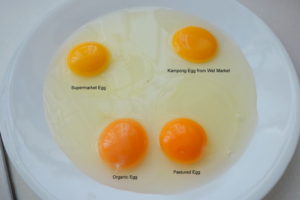
Lead in eggs
One unique concern, especially in New England, is lead. There have been a few studies that have demonstrated that lead can be found more frequently in backyard flock eggs. Our beautiful old houses in New England have historically had lead paint and lead pipes. Even if that has been resolved on a building, lead can often be found in the soil for years. Since these animals forage in that soil, they ingest lead and the lead can be passed into the eggs.
A study in New York showed higher lead levels in backyard chicken eggs, but still suggested that the levels would be below what would be considered safe for most people. However, eggs in the Boston area were found to have much higher levels of lead, and there could be reason for concern.
The good news is that there is a good correlation shown between lead levels in soil and in the eggs. There are many commercial labs that will test soil samples cheaply (also smart if you do gardening or have kids that play in the yard). A few will also test eggs.
If there are mildly increased levels of lead in the soil, then the solution may be as simple as topping with a few inches of fresh soil. You may also be able to identify areas of the yard with higher levels and fence them off from the flock.
Most lead concentrates in the yolk, so eating more egg white is more heart healthy and will reduce the concerns for lead exposure as well. Washing dirt from the eggs will help reduce exposure. If lead is found in the soil, then I would recommend also testing some eggs for lead and testing blood samples for lead and zinc. We are happy to help with blood testing.
Veterinary Care
Reproductive Disease
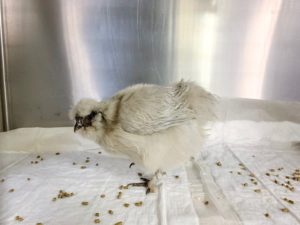
Silkie Chicken treated at Bulger for an infected joint.
Again, this is a very common concern with chickens. Birds have a common area for urine, feces, and eggs to all collect inside their body. With chickens, daily egg laying means that the oviduct is open far more than most other birds. That means that feces can get into the oviduct and create infection in the reproductive tract. Frequent egg laying also means very active follicles. Active cells have more chance for flaws in division of cells, leading to an increased chance for cancer.
If a chicken that is a good layer starts to slow down, it is best to bring them in for an exam sooner rather than later. They are very good at hiding their stress, and unfortunately it can become very serious before they visibly lose weight, lose their appetite, or act abnormally. Early detection of problems can avoid surgery or more severe disease.
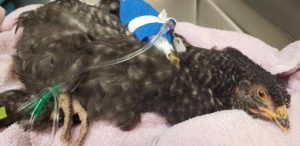
Chicken treated at Bulger after being attacked by a weasel.
Medication
Any medications or supplements should be prescribed by a veterinarian familiar with chickens. Anything eaten can end up in the eggs and therefore in the people who eat the eggs. This can be dangerous for allergies. There are many medicines that are completely forbidden in chickens and ducks for that reason.
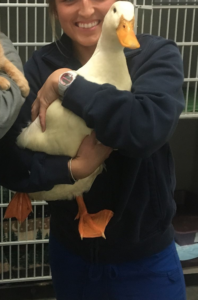
Duck treated at Capital District for wounds following an animal attack.
Any prescription medication should include a time that eggs should be discarded to avoid drug residue in the eggs. I usually put that right on the prescription label. If you get medication without that information, be sure to specifically ask about how long to discard eggs (or meat if you are raising birds for meat).
Enjoy your pets!
Keeping backyard flocks can be very rewarding. Not only are they very fun animals, but it provides good knowledge of where your food is originating and can teach children about good, healthy food and responsibility.
I am always available for any questions or concerns here at Bulger. We hope you won’t need to bring your backyard bird to us but if you do, we’re here.